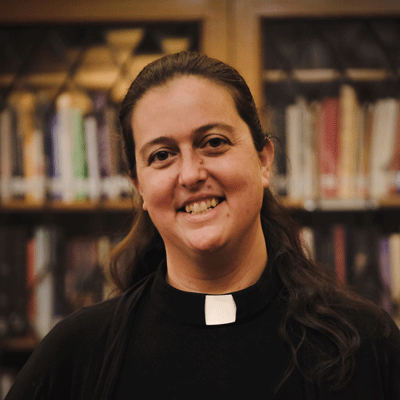‘Lift from the bottom, and everyone rises,’ the Rev. Dr. Liz Theoharis says on the New Way podcast
by Beth Waltemath | Presbyterian News Service

The Rev. Dr. Liz Theoharis
“I was raised to see that faith and justice were completely linked, and so I just think it’s about living out one’s faith,” says the Rev. Dr. Liz Theoharis, who talks with the Rev. Sara Hayden on the New Way podcast about being raised by an activist mother and where she is finding hope and challenge in her own activism and motherhood today.
The New Way podcast is a production of the 1001 New Worshiping Communities movement, hosted by Hayden and produced by Rev. Marthame Sanders through Mudeif Productions.
Theoharis is the executive director of the Kairos Center For Religions, Rights & Social Justice and the co-chair of the Poor People’s Campaign: A National Call for Moral Revival.
“Church was my second home,” says Theoharis, who remembers accompanying her mother every week to North Shore Presbyterian Church in Shorewood, Wisconsin, and to social justice meetings in the city. Theoharis taught Sunday school by age 13 and was ordained a deacon by age 16.
“I just always saw the work of making a more just world coming from my Christian upbringing,” says Theoharis. “I was lucky enough when I was a little girl to have all kinds of faith-rooted activists coming to Milwaukee and coming through my own home.” She remembers Archbishop Desmond Tutu, the Rev. William Sloane Coffin, and guests from El Salvador, South Africa and Israel-Palestine sitting around her table and feeling hope that there were people all over the world connecting their faith to the work of ending poverty and oppression.
Theoharis encourages people, “especially church folk,” to see solutions beyond charity. Citing Deuteronomy and the Jubilee and Sabbath codes, Theoharis describes the idea in the Bible as “lift from the bottom, and everyone rises.” While she admits that this is the opposite of the logic of our current economic system, there is evidence that it works.
Theoharis estimates that the United States spends $1 trillion annually on children in poverty, because childhood poverty results in more expansive policing and higher incarceration rates later in life. “A $1 investment in ending child poverty saves $7 in the future,” says Theoharis, who calls this “good economics.”
Investments like this are possible through policy changes. She cites the success of the child tax credit offered during the Covid pandemic shutdown. “That raised tens of millions of people up, and 4 million kids who are living below the poverty line were raised above the poverty line with just one social program of a couple hundred dollars a month.”
Raising the minimum wage in many states has shown similar benefits, according to Theoharis. Despite fears that doing so will make cheap food and goods more expensive, the effect is more positive investment in communities. “The reality is, and the quantitative facts are, that when you raise the minimum wage, that actually redounds the benefits to the whole community,” says Theoharis.
“When we organize society around the needs and demands of those who have little instead of those who have much, then actually everybody is lifted up,” she adds. The lifting up is both physical and spiritual for Theoharis, who describes how accepting the scarcity mentality and injustice of our current system limits our capacity to envision and worship a God who created enough and supports the thriving of Creation. “It’s literally only a very small percentage of the [wealthiest] 1% who do not benefit. And those folk will lose some resources, but probably they’ll gain more humanity,” says Theoharis.
In the second part of their conversation, Hayden and Theoharis look to the Bible for inspiration regarding anti-poverty programs and healthier societies through tending to the needs and health of the most vulnerable. Theoharis describes the “arc that starts in Genesis and goes all the way to Revelation,” where caring for the poor, welcoming the immigrant, and including and supporting others are the most common themes in the Bible. “There are 2,000 passages in the Bible about justice for the poor,” says Theoharis. “If you cut those passages out, you don’t have a Bible anymore. It all falls apart.” Alongside this imperative to care for the downtrodden and the disenfranchised is a vision of a society living within God’s spiritual and economic blessing.
“There need be no poor people among you,” Theoharis reads aloud from the Jubilee codes of Deuteronomy 15 (NIV), “for in the land the Lord your God is giving you to possess as your inheritance, he will richly bless you, if you only fully obey the Lord your God and are careful to follow all of these commands I am giving you today.”
To live into this vision, Theoharis draws on the communities and movements she’s helped to establish and sustain, such as the Freedom Church of the Poor and the Poor People’s Campaign, but she also leans into daily reflection and practice. Theoharis tells Hayden she reads the Bible daily and asks herself, “What am I doing today and every day to help poor people take action together?”
![]() You may freely reuse and distribute this article in its entirety for non-commercial purposes in any medium. Please include author attribution, photography credits, and a link to the original article. This work is licensed under a Creative Commons Attribution-NonCommercial-NoDeratives 4.0 International License.
You may freely reuse and distribute this article in its entirety for non-commercial purposes in any medium. Please include author attribution, photography credits, and a link to the original article. This work is licensed under a Creative Commons Attribution-NonCommercial-NoDeratives 4.0 International License.